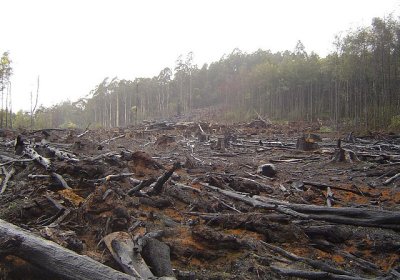The federal government wants to allow burning native forest waste to qualify for renewable energy subsidies under the Renewable Energy Target (RET).
They reached a compromise with Labor early this month for a renewable energy target of 33 gigawatt hours (GWh).
However, negotiations have since broken down due to the federal government’s fine print inclusion of burning native forest biomass in furnaces and the retention of two-yearly reviews of the RET.
Forests
Sixty people, including activists from Papua New Guinea (PNG) and ABC radio presenter Julie McCrossin, protested outside the federal government's Asia-Pacific Rainforest Summit on November 12.
The conference featured Liberal MPs Julie Bishop and Greg Hunt speaking to government ministers from the Asia Pacific region.
China’s Second Continent: How a million migrants are building a new Empire in Africa Howard W French Knopf Published May 20, 2014 304 pages www.howardwfrench.com In his 2009 film Rethink Afghanistan, director Robert Greenwald suggested that the US should not try to control the world through military means, but by building schools and hospitals in the countries it wishes to invade. Journalist Howard French's book China's Second Continent shows how such a model can work in practice.
About 5000 people protested outside Parliament House in Hobart on June 14 to call for the protection of Tasmania’s World Heritage forests.
The World Heritage Committee unanimously approved the extension of 120,000 hectares of new reserves to the Tasmanian Wilderness World Heritage property at a meeting in June last year. The forests were judged to have met all four natural heritage criteria.
The Tony Abbott government has done something no other government in the world has done before, asking UNESCO to take one of the nation’s unique natural areas off the World Heritage list.
In Tasmania, 170,000 hectares of forest was given World Heritage status in June last year.
Environmentalists have long considered the areas, which mostly border existing World Heritage areas, worthy of protection. Among them are well-known forests such as the Styx, Weld and Upper Florentine Valleys.
Victorian state government enterprise VicForests tabled its annual report in parliament in October last year, revealing that, for the sixth year running, the corporation had failed to pay a dividend to the state for being allowed to log publicly owned forests.
Two protesters chained themselves to a gate, preventing VicForests contractors from accessing a logging coupe for the day in the Toolangi State Forest north of Melbourne, on February 7.
The Toolangi State Forest is one of the few areas of forest unburned by the 2009 Black Saturday fire. Environmental campaigners have called for its incorporation into a proposed Great Forest National Park. It has been estimated that only 1% of the old growth tall forests of the central highlands area is left.
Tasmanian Premier Lara Giddings sacked Greens ministers Nick McKim and Cassie O’Connor from cabinet on January 15 — the same day that she announced a state election would be held in March.
The Greens have shared power with Labor since a minority government was elected in 2010. But the deal has proven unpopular with Labor voters and Giddings has ruled out a power-sharing deal with the Greens in future.
The Socialist Alliance is running two candidates in the Tasmanian state election on March 15.
Whether Labor or the Liberals form government after March 15, Tasmanians can expect to see “prioritising of big business over the interests of the general public and the continuing privatising of essential public services,” Jenny Forward, the Socialist Alliance's candidate for the electorate of Franklin, told Green Left Weekly.
Forest protesters disrupted work in the southern Tasmanian town of Esperance on July 16, disrupting operations of Malaysian logging company Ta Ann.
The Huon Valley Environment Centre (HVEC) said 40 people occupied the logging area and one person held a tree sit, which was attached to the logging machines.
HVEC spokesperson Jenny Weber said: “Controversially Ta Ann continues to receive timber from old growth ecosystems, and this logging area is forest that was promised protection, and now tragically the ancient eucalyptus regnans and wildlife habitat is being lost.
Some environmentalists have justified their support for the forest peace deal — passed by Tasmania’s Legislative Assembly on November 23 — on the grounds of not letting “perfect” become the “enemy of good”.
But a closer look at the details of the deal, which will allow the logging of native forests for another generation, makes clear it cannot even be called “good”.
The two-year negotiations between loggers and environmentalists, which many hoped would end the conflict over Tasmania’s forests, collapsed on October 27.
The Wilderness Society, a key negotiator in the talks, blamed the collapse on the Forest Industries Association of Tasmania (FIAT), which represents logging companies such as Malaysian logging firm Ta Ann and, previously, Gunns Ltd.
- Previous page
- Page 2
- Next page










